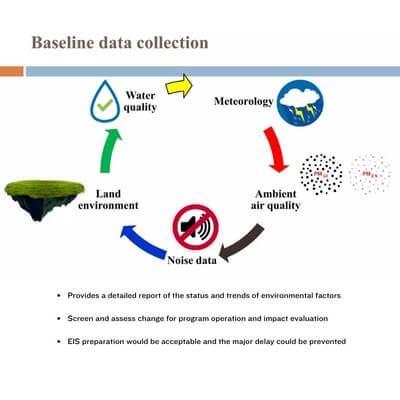

Baseline Data Collection in Environment Impact Assessment (EIA) includes collecting information about the current area environment such as flora, fauna, air, water, and human activities. The Importance of Baseline Data Collection in EIA helps people to make smart decisions on the proposed project, ensures compliance with regulatory demand, and supports minimizing the project’s adverse impacts on the environment and communities. The Baseline study for EIA targets established a transparent and deep understanding of human and natural systems in the project location.
The collection of baseline data serves two different purposes in the EIA. It belongs to a comprehensive assessment of an area’s existing environmental conditions and how the project needs to be implemented considering these conditions. Second Baseline Data Collection in EIA helps in forecasting the possible environmental changes, society, and economy once the project is underway.
Baseline Study for EIA helps in a deep understanding of the project area environment before starting any developing activities in the area. It offers detailed information on key environmental components. Baseline data are crucial for accurately monitoring and assessing changes over time, allowing for adaptive management strategies.
Relevance Of The Baseline Study in the EIA Process includes the “prediction” that involves a reference point for assessing the proposed project’s environmental impacts. The Baseline data collection serves as a reference against which potential changes can be assessed and contribute to future development strategies.
EIA Processes are vital to the identification of potential impacts across natural, social, and economic dimensions. It provided detailed information about the project area that helped to minimize adverse effects associated with the project. It is associated with the principles of sustainable development by balancing social considerations, and environmental and economic development.
The importance of Baseline Data Collection in EIA involve decision making. To elaborate, decision-makers, such as regulatory authorities, depend on baseline data to make informed decisions about the approval or modification of projects. Comparing baseline data with project impact predictions helps in deciding on appropriate mitigation measures.
Multifarious countries and locations have legal demands mandating the collection of baseline data as part of the EIA process. Meeting specific regulatory requirements and guidelines is important for achieving project approvals and complying with environmental regulations helps to develop your project.
The importance of Baseline Data Collection in EIA also involves “Public hearings” because it promotes transparency, environmental concerns, community engagement, and a more robust understanding of the project's potential impacts. By integrating local knowledge and addressing community concerns, baseline studies become more comprehensive and contribute to more sustainable socially responsible, and accountable project development.
To understand more about the EIA data collection, click HERE
Baseline data refers specifically to the qualitative and quantitative information collected during the initial phase of an EIA study or project to characterize the existing conditions.
The relevance of baseline data serves as a foundation for the subsequent stages of the environmental impact assessment, allowing potential impacts of the proposed project on water quality, air quality, biodiversity, and other relevant aspects.
Importance of Baseline Data Collection in EIA Several studies involved for best project development. Below mentioned studies offer a foundation for predicting potential impacts and formulating effective mitigation measures.
|
Physical Environment Baseline study |
Biological Environment Baseline Study |
|
Social And Cultural Environment Baseline Study |
Baseline Biodiversity and Ecological Study |
|
Economic Environment Baseline Study |
Land Use and Land Cover Baseline Study |
|
Water Quality and Quantity Baseline Study |
Noise and Vibration Baseline Study |
|
Baseline Visual and Aesthetic Impact Study |
Air Quality Baseline Study |
|
Baseline Waste Management Study |
Baseline Climate and Meteorology Study |
|
Baseline Socio-Economic Study |
Baseline Cultural Heritage Study |





We are the pioneers in offering environmental consulting services to our patrons, giving us the first mover advantage & keeping us ahead of our competitors.
Very experienced in filing, monitoring & submission of CDSCO Compliances, Drugs Manufacturing & sale guidelines, Environmental Impact Assessment, AERB consulting services, Pollution Control Board CTE & CTO Advisory Services, Waste Management Authorization from State Pollution Control Boards, Fertilizers & Insecticides Manufacturing, Wholesale & Import Compliances
